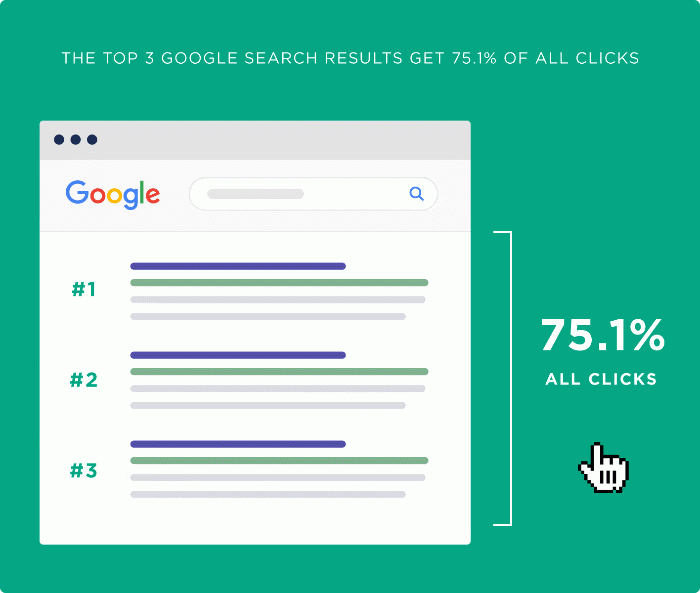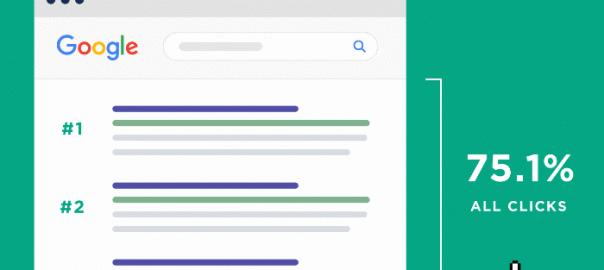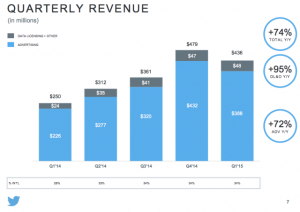Want to achieve better SEO results for the lowest possible cost?
SEO tools track the health of your website. They give you actionable data to make it more successful by identifying opportunities and weaknesses that could prevent you from ranking high in SERPs (search engine results pages).
Why SERPs are fundamental for SEO
When most people search, they click organic results on the first page of the SERPs and seldom visit page two.
This is why it’s critical to rank on the first page of Google — if your site appears on page two or beyond, you’re practically invisible.
 These 25 free SEO tools will help you optimize your website and improve your rank.
These 25 free SEO tools will help you optimize your website and improve your rank.
1. Google Pagespeed Insights
Google Pagespeed Insights checks the speed and usability of your site on multiple devices.
Enter a URL, and the tool will test the loading time and performance for desktop and mobile and identify opportunities to improve.
The mobile results also come with a user experience (UX) score, grading areas such as top targets and font sizes.
2. Moz Local Listings Score
Moz’s Local Listing Tool enables you to see how your local business looks online.
Moz crunches data from more than 10 different sources — including Google, Yelp, and Facebook — to score your brick-and-mortar business on how it looks online.
Results come complete with actionable fixes for inconsistent or incomplete listings.
3. Moz Link Explorer
Moz Link Explorer offers a complete overview of your website, pages, and links.
The free version gives you a quick look at the full range of link analysis, including the most impactful links coming your way and your most linked-to pages.
4. Keywordtool.io
Keywordtool.io gives you hundreds of keyword ideas based on a single keyword that you enter.
It provides a vast number of long-tail keyword opportunities and also answers common questions.
5. Google Analytics
Google Analytics offers complete website stats and search insights.
In addition to tracking your website traffic, it also surfaces many keyword insights into which terms people use to get to your page.
6. Google Structured Data Testing Tool
Google’s Structured Data Testing Tool uses live data to validate the structured data for any web page.
Structured data, also known as schema markup, is often referred to as the “language of search engines.” It makes it easier for search engines to contextualize, understand, and accurately match website content to relevant search queries.
7. Google Search Console and Bing Webmaster Tools
Google Search Console and Bing Webmaster Tools both do constant website analysis and create error reports and alerts.
They help you see what the two top search engines think of your site and reveal bugs and indexing issues.
8. Google Keyword Planner
Google’s Keyword Planner tells you what people are searching for.
Enter a keyword or a group of keywords, and the tool will return an array of helpful stats to steer your keyword strategy, including monthly search volume, competition, and suggested terms you may not have discovered.
9. Google Trends
Google Trends enables you to see the relative search popularity of topics.
It shows popular search terms over time, which helps uncover seasonal variations in search popularity, and more.
10. Google Business Review Link Generator
Customer reviews are vital for local SEO. The Google Business Review Link Generator creates a custom, shareable link for people to review your business on Google.
11. Google.com in an Incognito Window
Searching Google.com in an incognito window will bring up a list of autofill options, which can help guide your keyword research.
Being incognito ensures that any customized search data Google stores when you’re signed in is left out. Here are instructions for how to open an incognito window in Chrome, Firefox, and Safari.
12. Google SERP Snippet Optimization Tool
The Google SERP Snippet Optimization Tool from Higher Visibility previews how your pages will look in Google search results.
It helps you strategically construct page titles and meta description tags that will result in eye-catching listings in Google’s search results even before you publish a page or post.
13. Ahrefs’ Backlink Checker
Ahrefs’ Backlink Checker provides comprehensive link analysis.
The free version shows the top 100 backlinks to your website, along with the total number of backlinks and referring domains. Results include domain rating (DR) and URL rating (UR), where applicable.
14. Ahrefs SEO Toolbar
Ahrefs’ SEO Toolbar delivers instant SEO metrics for web pages and Google searches.
You can see how much traffic your web pages get each month, how many keywords they rank for, how many backlinks they have, etc.
It also shows the search volume, CPC (cost per click), and difficulty of every keyword you enter.
15. Ahrefs SEO Checker
Ahrefs’ SEO Checker gives a complete on-page analysis of your website.
It performs a comprehensive on-page analysis and uncovers issues such as missing alt tags, heading structure errors, and page bloat.
16. JSON-LD Schema Creator
The JSON-LD Schema Creator enables you to customize how your pages appear in search results.
It creates custom code to display your reviews, events, organization, and people the way you want on SERPs.
17. SimilarWeb
Use SimilarWeb to view site stats for any domain.
It estimates how much traffic a website gets and shows a breakdown of traffic sources, locations, and more. It’s beneficial for competitor research.
18. SERPRobot
SERPRobot shows you your ranking position for up to 5 keywords.
You can check your competitors’ rankings, too.
19. XML Sitemaps
XML Sitemaps creates an XML sitemap that you can submit to Google, Bing, and other search engines to help them crawl your website better.
Free for up to 500 pages.
20. BROWSEO
BROWSEO lets you see your website the way a search engine sees it.
Enter your site, and the tool will strip out everything but the basics, revealing how search spiders view your website.
21. SEO Site Checkup
SEO Site Checkup audits your website for on-page and technical SEO issues.
It checks for proper tags and surfaces any errors that come up.
22. Yoast SEO
The Yoast SEO WordPress Plugin ensures that your site meets the highest technical SEO standards. It also contains tools to optimize your content for SEO and overall readability.
When you’ve written a draft post, enter its main keyword and Yoast SEO will suggest how to tweak the content to optimize it for search engines.
23. LinkMiner
LinkMiner checks webpages for broken links and pulls metrics on those links.
It’s a Chrome extension that checks the HTTP status of all links on a page and highlights all broken (404) links in red.
24. Copyscape
Copyscape checks for duplicate content.
Enter a URL for a blog post or website, and the tool can tell you where else the content appears online.
25. Robots.txt Generator
The Robots.txt Generator creates an all-important robots.txt file for your website.
Search engines use robots (or user-agents) to crawl your pages. The robots.txt file defines which parts of a domain can be crawled by them.
Digital & Social Articles on Business 2 Community
(41)







